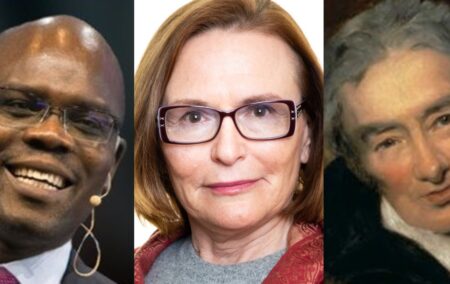Gabriel Crouse | 17 August 2019
Analyst Prince Mashele’s real problem with Helen Zille is that he does not like the idea of liberalism at its core.
Helen Zille joined the Institute of Race Relations (IRR) as a senior policy fellow and this made lots of people very angry. Prince Mashele penned his anger for the Sowetan under the headline Failure to acknowledge liberalism’s hurtful jabs on the poor is Zille’s downfall.
Mashele is offended because Zille said some nice things about German Chancellor Angela Merkel in a speech to the IRR. Zille said Merkel was “the politician I most admire” partly because she embraced refugees from Africa and South-West Asia.
Sies, says Mashele. Before Merkel was born, Hitler ruled Germany and slaughtered millions. Mashele correctly notes this but then somehow concludes that no German can claim “liberal credentials” ever again. What is difficult to understand is how Mashele can describe Merkel in positive terms, “innocent”, but believes that Zille should not admire her because she is German.
Mashele is right about one thing, though; liberalism is older than Germany. Classical liberalism is an ancient tradition based on the thought that people must be free, must be treated as agents of their own destiny. “Liber” is just an old (Latin) word that means free, the opposite of enslavement. Classical liberalism is opposed to slavery of all kinds, liberation is opposed to tyranny. Particular to no country, this is universal.
Besides the German connection, Mashele is offended by classical liberalism for two reasons. He does not like the people, long dead, who first argued for it. And he does not like the idea itself.
On the first point, he is correct. Immanuel Kant (died 1804) and John Locke (died 1704) were racists. Yet they wrote seminal texts on classical liberalism which stands against racism. There is a word for this kind of paradox, “hypocrisy”.
Is Zille a hypocrite? I think not. In the dark days of apartheid she fearlessly and relentlessly wrote against the system. Her reports of parliamentary antics humiliated the foolish apartheid government, and let us not forget that she was a ground-breaking reporter who went and spoke to the pathologists in order to expose the lie about Steve Biko’s death. While the government claimed he died of a hunger strike, Zille sought out the evidence to show that Biko was brutally murdered. She was harassed by the Nationalists, but she kept looking.
Later, as DA leader, Zille implemented a cleaner administration in the Western Cape and fought against Zuma while he and his cronies were robbing our country blind. She is as she was, the real deal.
Zille is on the lookout for fake liberals, and the thrust of her speech was precisely that we must all beware of people who call themselves “progressive liberals” when they are really just pushing an agenda to divide us by race and other social identities. These hypocrites cry about victims while making problems worse and stuffing their own pockets.
Mashele’s real problem with Zille is that he does not like the idea of liberalism at its core. He complains about “liberalism’s theoretical misrepresentation of the self”. He says “[liberalism’s] central idea” is “of a self who needs more isolation”. Does that make sense? Liberals like Zille want people to be isolated, lonely, apart?
The opposite of “isolation” is contact, which liberals embrace. Contact by mutual consent is the joy of life. We love to dance. We are opposed to forcedcontact.
Since Mashele is interested in history, here is an example from yesteryear to shine a light on the difference. William Wilberforce died in 1833 but not before playing a leading role in arguably classical liberalism’s greatest achievement, the abolition of slavery in Britain and beyond. You could say he was trying to “isolate” slaves from slave owners since he was cutting the chains of oppression. But, really, abolitionism aimed to stop forced contact between slaves and their invasive, often hypocritical, sometimes rapacious slave-owners.
Under apartheid, there was a similar problem. The government forced contact, forced millions of people to stay “together” in the “Bantustans” whether they liked it or not. Many found ways around this but the law force-marched them back again. We have had the option to change the laws of property since then, but we only changed them in cities and townships. So, almost 20 million people live without title deeds or long leases in economic atrophy in SA’s heartland, something liberals want to change.
The IRR also sees the forced ‘contact’ – attendance by learners – at schools riddled with absenteeism and afflicted by staff who worry more about South African Democratic Teachers’ Union issues than teaching. So we recommend a programme whereby the government gives vouchers to parents that can be redeemed at other schools so that low-cost private schooling options can be free to those who prefer it. This is not the same as wanting to “isolate” children in cold lonely rooms, as Mashele would see if only he paused to look.
The list of proposals goes on. These practical liberal arguments are not about “a self who needs more isolation”. They are arguments against forced contact. We argue for contact that is consensual, voluntary and free – classical liberalism at its essence.
Now that you see what classical liberalism stands for, remember what Wilberforce said: “You may choose to look the other way but you can never say again that you did not know.”
Gabriel Crouse is a writer and analyst at the Institute of Race Relations
If you like what you have just read, become a Friend of the IRR if you aren’t already one by SMSing your name to 32823 or clicking here. Each SMS costs R1.’ Terms & Conditions Apply.

